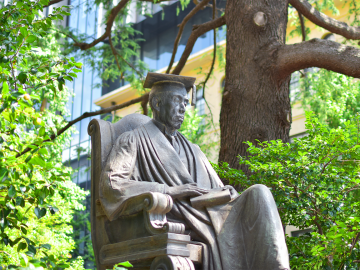Recent Legislation in Japan (Code of Criminal Procedure)
On the Agreement System [under Plea Bargaining]
Professor Takuichi Kawakami
(Research Staff, Waseda Law School)
(September 6, 2016)
1 The Effects of the June 2016 Partial Amendment of the Criminal Procedure Code Etc.
In May 2016, a law (Act No. 54 of 2016) partially amending the Criminal Procedure Code was enacted, and was promulgated on June 3 of the same year. The amendments were effected by this law on the basis of a report, unanimously agreed in the Legislative Council of the Ministry of Justice, on a draft report compiled through deliberations undertaken by the Special Committee on New-Age Justice System, positioned under the Legislative Council and acting on the request of the Minister of Justice in response to the proceedings of the Advisory Panel to Study on the Role of Prosecution (set up under the Minister of Justice in response to a chain of circumstances including the October 2010 clearing of an accused former Bureau Chief of the Ministry of Health, Labour and Welfare, etc.), along with the recommendations made by the same Commission. The deliberations of the Special Committee were covered and broadcast by the media as they progressed, and we may say that an interest in the amendments was taken by the general public.
The points of amendment were: 1) the introduction of a system for the recording and videotaping of interrogations; 2) the introduction of a system for cooperation in evidence-gathering and legal action (agreement system [under plea bargaining])” along with an “impunity system;” 3) the rationalization and optimization of wiretapping measures; 4) clarification of the circumstances under which decisions are to be taken on discretionary bail; 5) the enhancement of aid by counsel; 6) expansion of the discovery system; 7) the introduction of measures for the protection of victims of crimes etc., along with witnesses; 8) increasing of statuary penalties for the destruction of evidence, etc.; and 9) the introduction of measures for the easier and speedier processing of the circumstances under which confessions are made. We shall here outline the effect of 2), the “agreement system [under plea bargaining],” which, among the diverse amendments, constitutes a new investigative technique.
2 The Effect of the Introduction of the Agreement System [under Plea Bargaining]
Agreement [under plea bargaining] is a system which has been introduced as a new means of evidence-gathering, allowing testimony which can contribute to solving cases (including the circumstances of involvement etc. of such persons as ringleaders and those behind the scenes, with regard to organized crime etc.) to be obtained without excessive reliance on the process of interrogation.
Under this system, in cases where consent is forthcoming from counsel, the public prosecutor and suspect or defendant cooperate in order to contribute to solving criminal cases involving such suspect or defendant and third parties such as accomplices etc., and where the public prosecutor thinks it advantageous, agreement is made to the effect that the suspect or defendant involved in such case is not to be indicted or is to be subjected to a fixed lighter recommended sentence (Article 350.2 etc.). We may say that this system is founded on public prosecutors’ discretionary power to undertake legal action (Article 248).
3 Crimes for which the System Applies
The crimes for which this system applies are specified financial, drugs and firearms offenses. Crimes punishable by the death penalty or life sentence are excluded (Article 350.2.2). Although the cases of both suspect/defendant and of third parties such as accomplices etc. must involve the above specified offenses in order for this system to be implemented, it is not necessary that the charges be the same, nor is it necessary that all of the facts of the case overlap.
4 The Process of Agreement
Although the parties making the agreement are the public prosecutor and the suspect or defendant, the consent of counsel is required (Article 350.3.1). The content of the cooperation of the suspect or defendant to be agreed [under plea bargaining] is, with regard to the criminal cases of other parties: 1) giving true testimony under interrogation; 2) giving true testimony during witness examination; and 3) other cooperation as required for the submission of evidence (Article 350.2.1.1). On the other hand, the content of the procedures undertaken by the public prosecutor to be agreed [under plea bargaining] is, with regard to the case of the suspect or defendant: 1) not instituting prosecution; 2) rescinding prosecution; 3) instituting or continuing prosecution for specific charges [subject to] applicable penal statutes; 4) statement of opinion by the prosecutor during closing argument to the effect that the defendant should be subject to a particular penalty; 5) declaration of expedited trial proceedings; and 6) appeal for summary order (Article 350.2.1.2).
The public prosecutor and suspect or defendant may “agree to cooperation where the necessity for such cooperation is recognized, taking into account the importance of the evidence obtained,the circumstances and relative severity of the crime involved,the degree of [the suspect’s or defendant’s] involvement with related crimes and other factors” (Introductory clause to Article 350.2.1).
Also, agreement [under plea bargaining] is an act of formal character, such agreement being established by the preparation of documentation detailing the content of the agreement and its joint signing by all three parties, viz., the public prosecutor, the suspect or defendant, and counsel (Article 350.3.2). Then the public prosecutor and suspect or defendant respectively assume a binding duty to perform the contents of the agreement.
5 The Process of Negotiation
The prerequisite negotiations for agreement [under plea bargaining] are undertaken by the three parties of public prosecutor, suspect or defendant, and counsel (Body of Article 350.4). Where there are no objections on the part of either the suspect/defendant or counsel, the public prosecutor can conduct part of the negotiations with counsel alone. However, even where there are no objections on the part of either the suspect/defendant or counsel, the public prosecutor cannot conduct part of the negotiations with the suspect/defendant alone (Proviso to Article 350.4).
During negotiations, the public prosecutor can demand and hear from the suspect or defendant testimony on the criminal cases of other parties. However, because the hearing of such testimony forms part of the negotiation procedure, counsel is required to be present, and it differs from interrogation (Article 350.5.1). Furthermore, in cases where agreement [under plea bargaining] is not reached, the testimony of the suspect or defendant given during negotiations is not admissible as evidence (Article 350.5.2).
6 Special Cases of Trial Procedure
If the existence of the agreement and its content has a bearing on the progress of litigation of the case of the defendant who is party to such agreement and on the circumstances of such defendant, or has a bearing on the credibility of testimony based on such agreement in the criminal cases of other parties, the public prosecutor shall: 1) demand investigation of documentation of the content of such agreement or documentation of withdrawal from such agreement (such documentation prepared on the occasion of withdrawal from such agreement) in the trial of the defendant who is party to such agreement (Article 350.7); and 2) demand investigation of documentation of the content of such agreement or documentation of withdrawal from such agreement in the trial of other parties where testimony based on such agreement is being used as evidence ( Article 350.8 and 9).
7 Withdrawal from the Agreement
In cases where a party to the agreement is in breach of such agreement, the other party may withdraw from such agreement (Article 350.10.1.1). Also, even where the public prosecutor has recommended a penalty on the basis of such agreement, in cases such as where the court hands down a more severe penalty than that recommended, the defendant may withdraw from the agreement (Article 350.10.1.2); and in cases such as where, even though the suspect or defendant have given testimony on the basis of such agreement the contents of such testimony are in conflict with the objective facts, the public prosecutor may withdraw from the agreement (Article 350.10.1.3). Withdrawal from agreement [under plea bargaining] is also an act of formal character, therefore notification to the other party shall be made to the effect that the agreement is being withdrawn from, such notification made through a document stating the reason or reasons for such withdrawal (Article 350.10.2). Withdrawal renders the agreement null towards the future, and the parties to such agreement are not obliged to carry out the content of such agreement thereafter.
8 Ensuring the Performance of the Agreement
In cases such as those in which the public prosecutor institutes prosecution in violation of an agreement not to prosecute, the court must render a decision to dismiss proceedings etc. (Article 350.13). Also, where public prosecutors are in violation of an agreement, 1) the testimony of the suspect or defendant given during negotiations, and 2) evidence obtained from the defendant’s conduct on the basis of such agreement, shall be inadmissible (Article 350.14.1). Also, if, in violation of an agreement, a public prosecutor, public prosecutor’s assistant officer, or judicial police official gives false testimony or presents fabricated or falsified evidence, such party shall be subject to penal servitude not exceeding 5 years (Article 350.15.1). Meanwhile, when the party who committed the crime in question confesses before the judgement of both the criminal case of others related to the agreement [under plea bargaining] and the criminal case of the party who committed the crime in question is decided, the penalty shall be reduced or abrogated at discretion (Article 350.15.2).
9 Effective Date
This system shall come into effect by June 2, 2018, the date specified by cabinet oder. However, the manner in which it will be applied in practice remains to be seen at this point.
End of document




